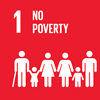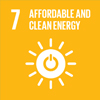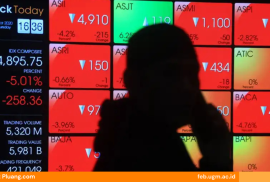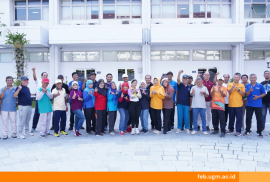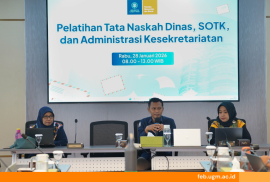
By Muhammad Edhie Purnawan, S.E., M.A., Ph.D
Department of Economics, Faculty of Economics and Business, Universitas Gadjah Mada (UGM)
Amid increasingly stringent U.S. economic protectionism, Indonesia faces a daunting test: to stand firm as a sovereign nation in global trade or be dragged into unilateral interests that erode its financial independence. With strategic strength in critical mineral sectors like nickel and structural challenges in labor-intensive industries, Indonesia’s economic diplomacy must be bright, firm, and bold.
What’s at stake is not merely trade balances, but the future of national industry, digital sovereignty, and social resilience in the face of global uncertainty. In this tense global landscape, Muhammad Edhie Purnawan, S.E., M.A., Ph.D., a lecturer at the Faculty of Economics and Business (FEB) Universitas Gadjah Mada (UGM), offers a sharp analysis of Indonesia’s bargaining position in tariff negotiations with the United States.
In an interview with the Editor-in-Chief of Indonesia Economic Magazine, Bambang Sadono, Edhie discussed the various dimensions of Indonesia’s challenges and opportunities candidly and data-driven. According to him, Indonesia’s bargaining position in tariff talks with the U.S. combines strengths and vulnerabilities. Indonesia’s primary strength lies in its critical mineral reserves, especially nickel, vital for the U.S. supply chain for electric vehicle batteries and advanced technology.
However, the U.S. protectionist scenario, especially if reinforced during Trump’s second term, increases pressure on Indonesia to provide bilateral concessions. Indonesia’s trade surplus, mainly from solar cell and white shrimp exports, provides some leverage.
“But our dependence on sectors like textiles, footwear, and electronics puts us at a disadvantage,” he stressed.
Edhie believes Indonesia’s diplomacy must become more adaptive. Diversifying export markets to ASEAN, RCEP (Regional Comprehensive Economic Partnership), and BRICS (Brazil, Russia, India, China, and South Africa) is key to reducing reliance on the U.S.
“Indonesia’s leadership in ASEAN, with Malaysia set to chair in 2025, can be leveraged to shape a collective response to global protectionism,” he added.
Strategic but Risk-Laden
In response to rising energy imports from the U.S., such as LPG and crude oil, Edhie explained that if the goal is to diversify energy sources and strengthen supply resilience amid geopolitical uncertainty, the U.S. is a reliable partner due to its energy extraction technologies. However, he cautioned that rising imports could deepen foreign energy dependence.
“Our domestic oil and gas production has fallen far below refinery needs. This adds to our vulnerability, especially with the 2025 state budget deficit projected at 2.53% of GDP,” Edhie said.
The solution, he suggested, is accelerating domestic energy development, facilitating technology transfer from U.S. companies, and diversifying suppliers to Australia and Canada.
Regarding Indonesia’s commitment to increasing soybean and wheat imports from the U.S., Edhie noted that domestic soybean production falls far short of national demand. While imports are necessary, they suppress local prices and threaten farmers who face limited technology and high production costs.
This strategy reduces the trade surplus, but the trade deficit may widen without balanced export growth. Indonesian food independence is at risk, especially as global supply chains are now vulnerable to disruptions.
“The solution is to support local farmers with subsidies, implement seasonal import quotas, and invest in agricultural technology,” he added.
Edhie criticized tax holidays and relaxed local content requirements to attract investment, saying they can be one-sided. Large U.S. corporations are better equipped to navigate local bureaucracy, while MSMEs, contributing 60% of GDP and employing 97% of the national workforce, often lose out.
Critical Minerals
Edhie Purnawan sees cooperation with the U.S. in the critical minerals sector, particularly nickel, as a strategic opportunity but also carries structural risks that Indonesia must not ignore. This cooperation makes Indonesia a vital link in the global clean energy supply chain. However, overreliance on U.S. investment and markets may limit Indonesia’s negotiation flexibility, especially if U.S. firms dominate mining operations. Local ownership and technology transfer must be non-negotiable conditions in mineral partnerships.
“Indonesia must safeguard the sovereignty of its mineral sector and accelerate export diversification to Europe, Japan, and South Korea, so we don’t become overly dependent on a single market,” he emphasized.
He supports large-scale investment in domestic refining to optimize downstream processing. On the policy of relaxing horticultural imports such as apples and grapes from the U.S., Edhie acknowledged the short-term consumer benefits but warned of long-term risks.
“Lowering prices in the market does ease the burden on consumers, especially ahead of Ramadan and Eid. But it’s a blow to our local farmers, whose production costs are higher and yields lower,” he noted. He recommends implementing seasonal import quotas and high-quality standards to maintain market balance.
“Investment in local farmer training and agricultural technology is essential to enhance our farmers’ competitiveness,” he concluded.
Bulog Monopoly
Addressing the business-to-business (B2B) investment scheme promoted to attract U.S. capital, Edhie highlighted the disparity in access. These schemes often benefit large corporations, while our MSMEs, the backbone of the economy, struggle to compete due to limited capital and networks. He also criticized Bulog’s monopoly in food imports, arguing that monopolies slow supply chains and add costs. Partial liberalization with tight oversight is necessary to improve efficiency while safeguarding food security. He emphasized that digitalizing the commodity balance system enhances transparency and efficiency.
Responding to U.S. criticism of QRIS and the National Payment Gateway (GPN), Edhie defended Indonesia’s position. “QRIS and GPN are pillars of our financial inclusion. They involve over 26 million merchants, the majority being MSMEs, and cut transaction costs to as low as 0.7%, far below the global average.”
However, he recommended that Indonesia pursue interoperability with global systems like Visa and Mastercard to ease tensions and strengthen its negotiating position, while firmly upholding data localization principles and maintaining high security standards.
Indonesia maintains control over its domestic payment infrastructure to strengthen its digital economic sovereignty amid global pressures.
Smart Diplomacy
Edhie acknowledged that import permits and surveyor reports, non-tariff barriers (NTBs), increase trade costs, and protect strategic national sectors. He suggested that deregulating non-essential NTBs could serve as a concession to the U.S. In return, Indonesia should gain greater access to its textile and white shrimp exports to the American market. He also supported accelerating import processing through digitalization using the Indonesia National Single Window (INSW).
He referred to the relaxation of local content requirements (TKDN) in the data center sector as a double-edged sword. While it could attract tech giants like Google and Microsoft and accelerate digital infrastructure development, without proper control, it risks surrendering national data sovereignty.
Edhie proposes a tiered approach. He allows relaxation but requires it to come with technology transfer, local workforce training, and data localization on domestic servers. He supports the government’s plan to fund a Technology Innovation Center through the state budget to incubate local startups and build domestic capacity and innovation.
Opening Doors to Global Investment While Guarding Local Sovereignty
Edhie assigns a heavy responsibility to Indonesia’s Deregulation Task Force: to open doors to global investment while actively protecting national sovereignty from unchecked liberalization.
He demands that the Deregulation Task Force act as a fortress, not merely a bridge. They must welcome investment, but never surrender control over natural resources and workers’ welfare to soulless market forces. He highlights that strategic sectors like energy, minerals, environment, and labor require special attention. He reminds everyone that nickel, which supplies nearly 50% of the world’s demand, serves as an economic commodity and geopolitical tool in global diplomacy.
He warns against underestimating nickel. It is not just metal, but the political instrument of the future. Losing control over nickel means pawning Indonesia’s bargaining power on the global stage
Edhie urges policymakers to prioritize labor-intensive sectors, such as textiles and manufacturing, contributing 15% of the national GDP in any deregulation scheme. He emphasizes that exploiting labor is a moral failing and a direct threat to economic stability.
“When we allow investors to squeeze workers in the name of growth, we don’t just lose our dignity, we build a socio-economic time bomb,” he warned.
He also underscores that transparency must serve as the foundation of deregulation. “Without clear economic impact indicators and regular public audits, we don’t reform, we simply shift from a corrupt bureaucracy to corrupt deregulators, he said.
The Price of Globalization
In the scheme of global negotiations, Edhie warns of the threat of a worst-case scenario. Indonesia makes excessive concessions without commensurate reciprocity from partner countries, particularly the United States.
“If we give in to US tariff pressure without securing fair reciprocity, we are writing a recipe for deindustrialization,” he said.
Using the analogy of the Prisoner’s Dilemma in game theory, Edhie assessed that giving in without careful calculation will cause Indonesia to bear a swollen trade deficit, rising unemployment, and a destroyed industrial sector. Instead, he proposes a tit-for-tat strategy, linking each concession to a concrete commitment from the US, such as the removal of textile tariffs or investment in nickel downstreaming.
Every concession must be directly proportional to actual returns. Never assume goodwill is free at the global negotiating table. Furthermore, he emphasized the importance of diversifying trading partners and reducing over-reliance on the US.
Regional Leader
Edhie also identifies excellent opportunities. He believes that if Indonesia negotiates smartly and precisely, the country can solidify its role as a regional economic leader. He urges the government to back this move with concrete domestic reforms, by streamlining investment permits, accelerating 5G infrastructure development, and investing in green energy innovation centers.
“Don’t just hope for foreign negotiations. Without internal improvements, we are just building sand castles,” he said.
He emphasized that access to the CPTPP and strengthening positions in BRICS are key steps to expanding Indonesia’s trade network. With this strategy, according to Edhie, Indonesia can create inclusive growth and maintain resource sovereignty while accelerating the transformation to a digital and green economy.
*Published in Majalah Ekonomi
Sustainable Development Goals

